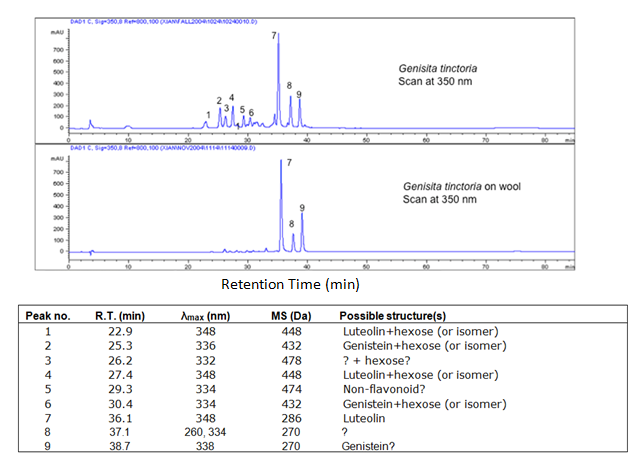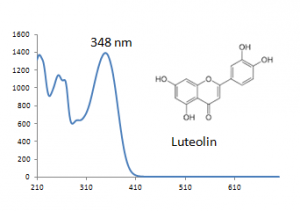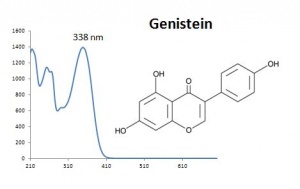Difference between revisions of "Dyer's greenweed (Genista tinctoria) LC"
| (4 intermediate revisions by the same user not shown) | |||
| Line 1: | Line 1: | ||
| − | [[File:|thumb| | + | [[File:135px-Genista tinctoria 001.JPG|thumb|Plants of Genista tinctoria, By H. Zell - Own work, CC BY-SA 3.0, https://commons.wikimedia.org/w/index.php?curid=10212397]] |
== Description == | == Description == | ||
| + | The ''Genista tinctoria'' is called dyer’s greenweed or dyer's broom. It is a variable deciduous shrub growing to 60–90 centimetres (24–35 in) tall by 100 cm (39 in) wide, the stems woody, slightly hairy, and branched. Golden yellow pea-like flowers are borne in erect narrow racemes from spring to early summer. | ||
== Historical importance == | == Historical importance == | ||
| Line 9: | Line 10: | ||
== Summary of results == | == Summary of results == | ||
| − | + | Falvonoids were identified from the extraction of ''Genista tinctoria'' dyed samples. Luteolin and Genestin could possibly be the main dyeing components. | |
== Analytical instrumentation and procedures == | == Analytical instrumentation and procedures == | ||
| + | HPLC-DAD-MS analysis was performed with an Agilent 1100 liquid chromatography system consisting of an automatic injector, a gradient pump, a HP series 1100 DAD, and an Agilent series 1100 VL on-line atmospheric pressure ionization electrospray ionization mass spectrometer. Separations were done on a Vydac 214TP52 analytical column (2.1 mm diameterX250 mm; 5-ím particle size). The column was eluted at a flow rate of 0.2 mL/min with a tertiary gradient of water (A),acetonitrile (B), and 1% (v/v) aqueous formic acid (C) with the following elution program: 0 min, 90% A, 5% B, 5% C; 0-55 min, a linear gradient to 35% A, 60% B, 5% C; 55-60 min, a linear gradient elution to 15% A, 80% B, 5% C; 60-62 min, isocratic elution at 15% A, 80% B, 5% C; 62-70 min gradient elution to 90% A, 5% B, 5% C; and reequilibration with the latter solvent for 15 min. The mass spectrometer was run both in the negative and positive ion mode. | ||
== Chromatograms == | == Chromatograms == | ||
| Line 48: | Line 50: | ||
| 338 | | 338 | ||
| | | | ||
| − | |||
| − | |||
| − | |||
| − | |||
| − | |||
| − | |||
| − | |||
| − | |||
| − | |||
| − | |||
| − | |||
| | | | ||
|} | |} | ||
Latest revision as of 08:35, 29 September 2017

Description
The Genista tinctoria is called dyer’s greenweed or dyer's broom. It is a variable deciduous shrub growing to 60–90 centimetres (24–35 in) tall by 100 cm (39 in) wide, the stems woody, slightly hairy, and branched. Golden yellow pea-like flowers are borne in erect narrow racemes from spring to early summer.
Historical importance
Summary of results
Falvonoids were identified from the extraction of Genista tinctoria dyed samples. Luteolin and Genestin could possibly be the main dyeing components.
Analytical instrumentation and procedures
HPLC-DAD-MS analysis was performed with an Agilent 1100 liquid chromatography system consisting of an automatic injector, a gradient pump, a HP series 1100 DAD, and an Agilent series 1100 VL on-line atmospheric pressure ionization electrospray ionization mass spectrometer. Separations were done on a Vydac 214TP52 analytical column (2.1 mm diameterX250 mm; 5-ím particle size). The column was eluted at a flow rate of 0.2 mL/min with a tertiary gradient of water (A),acetonitrile (B), and 1% (v/v) aqueous formic acid (C) with the following elution program: 0 min, 90% A, 5% B, 5% C; 0-55 min, a linear gradient to 35% A, 60% B, 5% C; 55-60 min, a linear gradient elution to 15% A, 80% B, 5% C; 60-62 min, isocratic elution at 15% A, 80% B, 5% C; 62-70 min gradient elution to 90% A, 5% B, 5% C; and reequilibration with the latter solvent for 15 min. The mass spectrometer was run both in the negative and positive ion mode.
Chromatograms
Sample information
Identified compounds
| Compound | RT (min.) | MW | UV/vis | Other | |
|---|---|---|---|---|---|
| Luteolin | 36.1 | 286 | 348 | Comments here | |
| Genistein | 38.7 | 270 | 338 |
References
[1] [2] [3]



